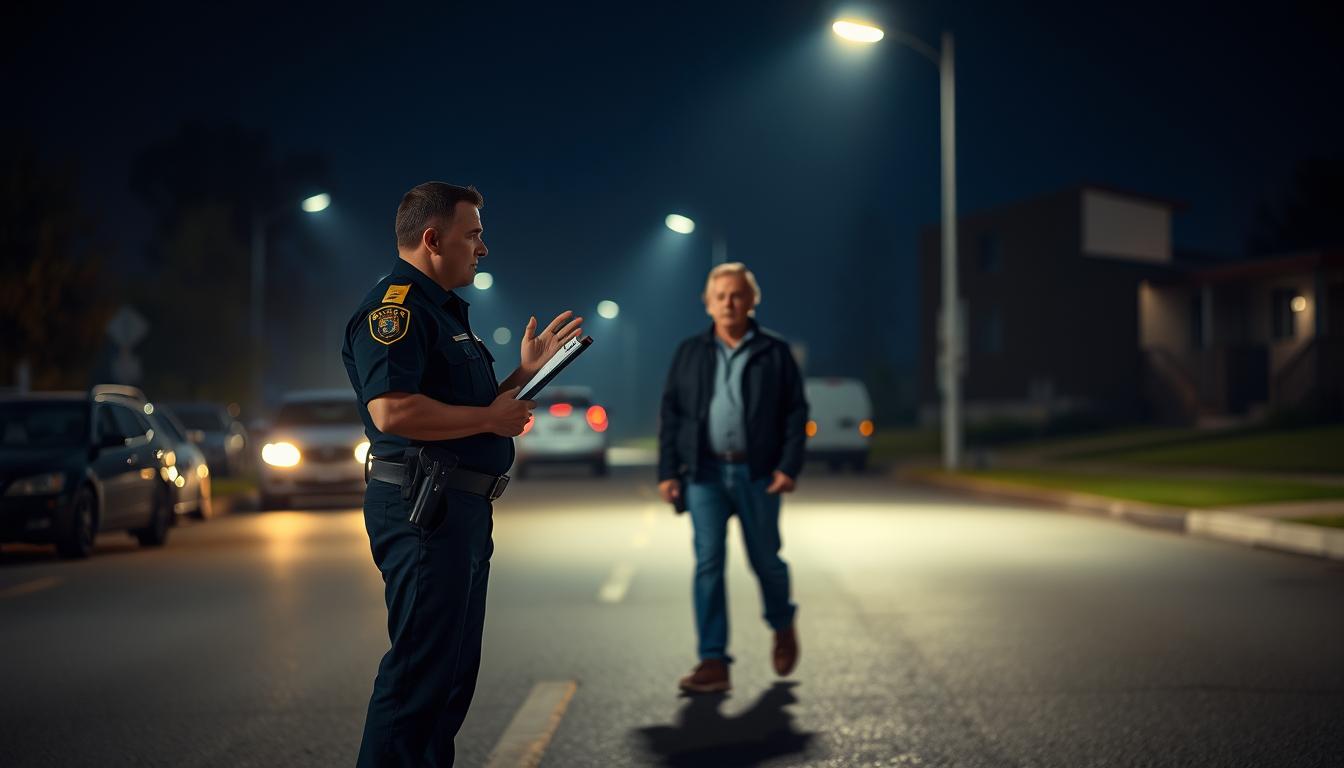Nearly 1.5 million drivers are arrested each year in the U.S. for DUI. Field sobriety tests are key in these arrests. It’s vital to grasp their role in DUI cases.

I will dive into what these tests are, why they matter, and if they can be used in court. We’ll look at their limits and what makes them admissible.
Key Takeaways
- Understanding the role of field sobriety tests in DUI arrests.
- The significance of test admissibility in court proceedings.
- Factors influencing the admissibility of field sobriety tests.
- Limitations of field sobriety tests in determining DUI.
- The importance of legal representation in DUI cases involving field sobriety tests.
Understanding Field Sobriety Tests
It’s important to know how field sobriety tests work. These tests are physical and mental exercises. They help police figure out if a driver is drunk.
Definition and Purpose
Field sobriety tests check if a driver can move well and follow directions. They help police see if a driver is drunk. The National Highway Traffic Safety Administration (NHTSA) makes sure these tests are fair and consistent.
When and Why They’re Administered
Police give these tests during a stop if they think a driver might be drunk. They look for signs like bad driving or smelling alcohol. The test results can help prove if a driver is drunk in court.
| Test Type | Purpose | Assessment Criteria |
|---|---|---|
| Standardized Field Sobriety Tests | Evaluate intoxication level | Balance, coordination, and instruction following |
| Non-Standardized Field Sobriety Tests | Supplemental assessment | Varies by test |
The Three Standardized Field Sobriety Tests
Across the United States, law enforcement uses three main field sobriety tests. These are the Horizontal Gaze Nystagmus (HGN) test, the Walk-and-Turn test, and the One-Leg Stand test.
Horizontal Gaze Nystagmus (HGN) Test
The HGN test checks for eye jerks when following a light or finger. It looks for signs of alcohol use. An officer checks for clues in each eye, like jerky movements. Six clues can show a driver might be impaired.
Walk-and-Turn Test
The Walk-and-Turn test checks a driver’s ability to follow directions and perform tasks. Drivers must walk nine steps, turn, and walk back. The officer looks for clues like starting too soon or losing balance.
One-Leg Stand Test
The One-Leg Stand test tests balance and coordination. Drivers stand on one leg and count until told to stop. The officer checks for signs of imbalance, like swaying or hopping.
| Test | Clues for Impairment | Assessment |
|---|---|---|
| HGN | Lack of smooth pursuit, nystagmus at max deviation, onset before 45 degrees | Nystagmus detection |
| Walk-and-Turn | Starting before instructions finished, stepping off line, not touching heel-to-toe | Balance, coordination, instruction following |
| One-Leg Stand | Swaying, using arms for balance, hopping, putting foot down | Balance, coordination |
Knowing about these field sobriety tests is key. They help police check if a driver is impaired. But, how well they work can depend on many things, like the environment and the officer’s training.
Non-Standardized Field Sobriety Tests
Officers might use other tests to check if a driver is sober. These tests are not always accepted and can be debated about their trustworthiness and if they can be used in court.
These tests include various ways to see if a driver is impaired. Below are some common ones.
Finger-to-Nose Test
The Finger-to-Nose test asks the driver to touch their nose with their eyes closed. This test can be affected by many things, like how well the driver can follow instructions. Critics say it’s not based on science and can be biased by the officer.
Alphabet and Counting Tests
These tests ask the driver to say the alphabet or count backwards. They check if the driver can think clearly and follow directions. But, they can also be influenced by things like being nervous or not being well-educated.
Romberg Balance Test
In this test, the driver stands still, tilts their head back, and tries to guess 30 seconds have passed. It checks the driver’s balance and sense of time. But, because it’s based on guessing, its reliability is in doubt.
Whether these tests can be used in court is often questioned. Courts look at things like the officer’s training, the test conditions, and if the test is scientifically sound.
- Key considerations for admissibility include:
- The officer’s level of training and certification
- The presence of any environmental or physical conditions that could affect the test results
- The scientific reliability of the test
In summary, while these tests might give some clues about a driver’s state, their subjective nature and lack of standardization make them questionable for court use.
Are Field Sobriety Tests Admissible in Court?
To know if field sobriety tests can be used in court, we need to look at the law and science. These tests are key in DUI cases. But, courts carefully check if they can be used as evidence.

General Legal Standards for Admissibility
Field sobriety tests must meet certain legal rules to be allowed in court. Courts check if the tests were done right and if they matter to the case. The relevance of these tests is their ability to show if someone is drunk. The reliability is about how consistent and accurate the results are.
The evidence also has to follow the rules of evidence in the area. This means the tests must be done by a trained officer. And the results must be recorded correctly.
Scientific Reliability Requirements
The science behind field sobriety tests is also important. The tests must be proven to work well and accurately show if someone is drunk. This means looking at how the tests are done and the evidence that supports them.
Experts often give their opinions in court about these tests. They talk about how well the tests work, including any chances of wrong results.
By understanding both the law and science, we can see how complex it is to use field sobriety tests in court.
Factors Affecting the Admissibility of Field Sobriety Tests
Several key factors influence whether field sobriety tests can be used in court. These factors are important for determining if the test results are reliable and valid.
Officer Training and Certification
The training and certification of the officer giving the test are critical. Proper training ensures the officer can conduct the tests correctly and understand the results. For example, officers need to be certified in the Standardized Field Sobriety Test (SFST) program. This includes the Horizontal Gaze Nystagmus (HGN), Walk-and-Turn, and One-Leg Stand tests.
- Officers must get thorough training to grasp the nuances of each test.
- Certification programs keep officers up-to-date with the latest methods.
Proper Administration Procedures
How field sobriety tests are given is also key. Tests must be done under standardized conditions to be reliable. This means following specific instructions and avoiding any changes that could affect the results.
- Tests should be given in a consistent and controlled setting.
- Officers should be aware of and avoid any biases during the test.
Environmental and Physical Conditions
Environmental and physical conditions can greatly impact field sobriety test results. Factors like weather, terrain, and physical condition can affect performance. For example, uneven terrain can affect the Walk-and-Turn test, while windy conditions can impact the One-Leg Stand test.
- Weather conditions like rain or extreme temperatures can affect test results.
- Physical conditions, including disabilities or injuries, can also impact an individual’s ability to perform the tests.
In conclusion, the admissibility of field sobriety tests in court depends on several factors. These include officer training, proper administration, and environmental conditions. Ensuring these factors are managed well is crucial for fair and accurate use of field sobriety test evidence.
State-by-State Variations in Field Sobriety Test Admissibility
Field sobriety tests have different rules in each state. This means how these tests are used in court varies. It shows how different states handle DUI cases.
States with Full Admissibility
In some places, like California and Florida, field sobriety tests are always accepted. Courts trust these tests if they’re done right by trained officers.
States with Limited Admissibility
Other states have rules that limit when these tests can be used. For example, in New York, only certain tests are allowed. Texas also has rules for when these tests can be used in court.
Recent Legal Changes
Legal rules about field sobriety tests have changed recently. In 2022, Arizona made its rules stricter. This change affects how these tests are used in court.

Knowing the rules about field sobriety tests is key. Legal standards keep changing. It’s important to keep up with these changes in different places.
Challenging Field Sobriety Test Evidence in Court
Field sobriety test evidence can be challenged in court. As a defendant in a DUI case, knowing how to defend yourself is key. This knowledge helps build a strong case.
Common Defense Strategies
One way to challenge field sobriety test evidence is by questioning how the tests were given. This includes pointing out any mistakes in how the tests were done. It also involves questioning the officer’s interpretation of the results.
Key defense strategies include:
- Reviewing the officer’s training and certification records
- Examining the conditions under which the tests were administered
- Identifying any medical conditions that could have affected the defendant’s performance
Medical Conditions That May Affect Performance
Some medical conditions can really mess with how well someone does on field sobriety tests. For instance, inner ear problems can mess with balance. Neurological conditions can affect coordination and eye movements.
| Medical Condition | Potential Impact on Field Sobriety Tests |
|---|---|
| Inner Ear Disorders | Affect balance and equilibrium |
| Neurological Conditions | Impact coordination and eye movements |
| Musculoskeletal Issues | Affect ability to perform physical tasks |
Procedural Errors and Their Impact
Procedural errors during field sobriety tests can also be grounds for challenge. This includes not following the right procedures or ignoring environmental factors that could affect the results.
Understanding these points and using effective defense strategies can help challenge field sobriety test evidence in court.
Your Rights During Field Sobriety Testing
Knowing your rights during field sobriety testing is key. These tests check if you’re driving under the influence. It’s important to know how to act when stopped by police.
Can You Legally Refuse a Field Sobriety Test?
In most states, you can refuse a field sobriety test. But, it’s important to know what happens next. Refusing might not have the same penalties as a chemical test, but it can still affect your case.
Think about why you’re being stopped and how you feel about the tests. Remember, field sobriety tests are not always accurate. They can be affected by many things, like the weather and how you’re feeling.
Consequences of Refusal
Refusing a field sobriety test can have consequences. Police might think you’re guilty or trying to hide something. This could make them more likely to arrest you.
| Consequence | Description | Potential Impact |
|---|---|---|
| Increased Suspicion | Law enforcement may view refusal as a sign of guilt. | Higher likelihood of arrest. |
| Arrest and Charges | Refusal can lead to arrest based on other observed factors. | Potential for DUI charges. |
| License Implications | While refusal itself may not directly affect your license, an arrest could. | Potential for license suspension. |
Even if you refuse field sobriety tests, police can still arrest you. They might use other evidence, like how you were driving or if they smell alcohol or drugs.
Alternatives to Field Sobriety Tests in DUI Investigations
Law enforcement is now using new methods instead of field sobriety tests. These new tools include chemical tests and advanced technologies. They give more accurate and reliable results.
Chemical tests are key in DUI cases. They include:
- Breath Tests: Breathalyzers measure BAC from a breath sample. They’re easy to use and give quick results.
- Blood Tests: Blood tests directly measure alcohol levels from a blood sample. They’re very accurate but take longer to get results.
- Urine Tests: Urine tests can find alcohol and other substances. Though not common for DUI, they’re used in some cases.
Chemical Tests (Breath, Blood, and Urine)
Chemical tests directly measure BAC, unlike field sobriety tests. They’re vital in proving a DUI case. The court accepts these tests if the devices are well-maintained and the testers are qualified.
Advanced Technology in DUI Detection
New technologies are making DUI detection better. Some of these include:
- Advanced Breathalyzers: New breathalyzers have digital displays and can store data. This makes it easier to check and save test results.
- Facial Recognition and Other Technologies: New tech like facial recognition is being looked at to spot signs of being drunk.
These new methods are a big step forward in DUI investigations. They give police more ways to find and charge DUI offenders.
Conclusion
I’ve looked into the complex world of field sobriety tests and their role in court. Whether these tests can be used in court depends on many things. This includes how well police are trained, how the tests are given, and the laws of each state.
It’s key to know if field sobriety tests can be used in court. This involves looking at how reliable these tests are and the setting in which they’re done. This knowledge helps people understand their legal situation better and defend themselves more effectively.
The issue of whether field sobriety tests can be used in court is very important in DUI cases. It can greatly affect the outcome of a case. As laws and court practices change, it’s important to stay up to date on how field sobriety tests are used in court.
FAQ
Are field sobriety tests always admissible in court?
No, field sobriety tests aren’t always allowed in court. Their use depends on several factors. These include how reliable the tests are, the officer’s training, and the test conditions.
What are the three standardized field sobriety tests?
The three main field sobriety tests are the Horizontal Gaze Nystagmus (HGN) test, the Walk-and-Turn test, and the One-Leg Stand test. These tests are used by police and are seen as good signs of intoxication.
Can medical conditions affect the results of field sobriety tests?
Yes, some medical issues can mess up field sobriety test results. For instance, people with balance problems or neurological conditions might struggle. This can lead to wrong results.
Can I refuse to take a field sobriety test?
You can choose not to take a field sobriety test. But, refusing might lead to penalties like losing your license. It’s important to know your rights and what might happen if you refuse.
How can I challenge field sobriety test evidence in court?
To challenge field sobriety test evidence, you need to understand the tests well. Look at their limits and any biases. Common strategies include pointing out medical issues, mistakes in how the test was done, and other factors that might make the test unreliable.
Are there alternatives to field sobriety tests in DUI investigations?
Yes, there are other ways to check for DUI. These include chemical tests like breath, blood, and urine tests. Also, technology like breathalyzers and facial recognition software is used.
Do state laws affect the admissibility of field sobriety tests?
Yes, state laws play a big role in whether field sobriety tests can be used in court. Some states let them in fully, while others limit their use or have changed their laws recently.
What is the significance of officer training and certification in field sobriety testing?
Officer training and certification are key to making field sobriety tests reliable. Proper training and certification help reduce mistakes. They ensure the tests are done right.
Can environmental and physical conditions affect the results of field sobriety tests?
Yes, things like weather, terrain, and lighting can change field sobriety test results. These conditions can make the tests less accurate and reliable.
